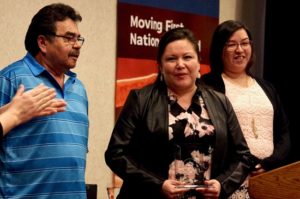Beausoleil First Nation recognized for recent housing complex

By Rick Garrick
THUNDER BAY—Beausoleil First Nation’s recent completion of a six-plex housing complex was recognized during the 2019 Community Housing Recognition Awards ceremony at the First Nations Housing Conference (FNHC) in Thunder Bay.
“It’s very awe-inspiring to be recognized and to receive [the award] amongst our other fellow peers across not only Ontario, but the country,” says Jasmine Copegog, housing manager assistant and tenant liaison with Beausoleil. “We keep moving forward and just [keep] ensuring that every year we are providing housing and we are assisting with maintaining current housing.”
Beausoleil built the six-plex energy efficient housing complex through about $1, 176,000 in funding from the federal government’s Budget 2016 Immediate Needs Fund.
“We see how high the need [for housing] is when vacant houses become available for posting,” Copegog says. “Often we have 40 people applying for one home, so we know what the need is. That is why we apply for whatever funding we can get, the max, and just keep building.”
Amanda Mixemong, housing manager with Beausoleil, says the community was “very pleased and honoured” to be nominated for the 2019 Community Housing Recognition Awards.
“We found out a couple of months ago and we’ve been really excited about it,” Mixemong says. “We would like to keep building homes for our [citizens] at Beausoleil First Nation and just continue with building sustainable housing.”
Muskrat Dam, North Caribou Lake and Wauzhushk Onigum were also recognized with 2019 Community Housing Recognition Awards at the FNHC, which was held Feb. 26-28 at the Valhalla Inn.
“We had four recognition awards — normally we talk about which communities have built innovative housing and even just a commitment to housing,” says Jonathan Gregg, one of the main planners of the FNHC and a Lac Seul citizen. “Sometimes it is about the type of housing units they have built, and even if a community has been struggling and hasn’t been able to build units because of circumstances, funding, availability of lots, we acknowledge them. And even people that go above and beyond, where individuals want to strive and work with their community and build homes and meet building codes, we want to recognize their commitment also.”
The FNHC also featured the annual Builders Challenge demonstration and competition hosted by Jon Eakes, a building expert, and a variety of presentations on housing, including Enhancing Your Housing Data by Randy Roy, infrastructure specialist with the Waabnoong Bemjiwang Association of First Nations and a M’Chigeeng citizen.
“My presentation was largely sharing my experience in trying to design and develop an asset management program for our six member communities,” Roy says. “We found that data is all over the place, and so much of our project is trying to centralize this data in one spot that we can manage ourselves and move forward harnessing this type of information.”
Roy says this is the third year that he attended the FNHC.
“I would like to spread the word and tell others that this is a good session that they can get a lot out of,” Roy says.
The First Nations Housing Working Group (FNHWG) also introduced the First Nations Housing Community, a new association and innovation of the FNHWG, on the second day of the FNHC.
“This is a huge step for the evolution of the conference and the Working Group that organizes it,” says Clarence Meekis, a member of the FNHWG. “The Working Group is committed to working with First Nations, government and industry across Canada to create a new First Nation-led approach to providing viable housing solutions to First Nations communities.”


